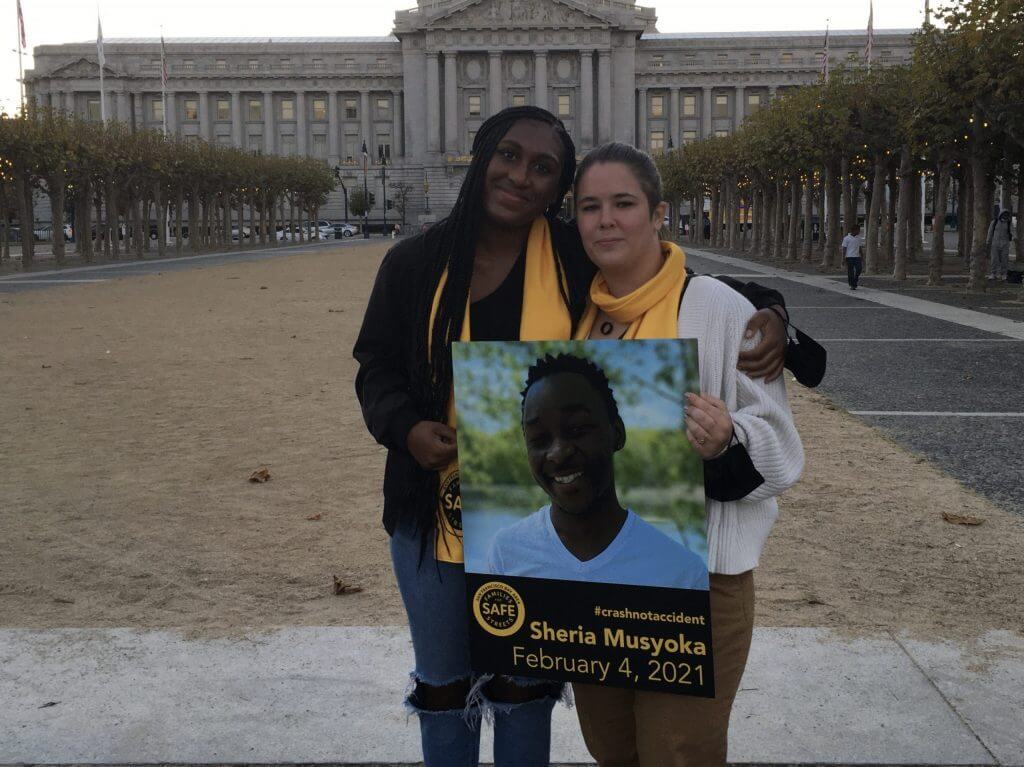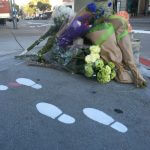Hannah’s journey in grief

Hannah (right) at World Day of Remembrance for Road Traffic Victims in 2021.
This is a guest post by Hannah Ege, whose husband Sheria Musyoka was hit and killed by a driver in San Francisco. After losing Sheria, Hannah and son Theo relocated to Philadelphia where they are rebuilding their lives and honoring Sheria’s legacy. Hannah is a writer, teacher, advocate, and parent. Hannah writes educational content as well as poetry, non-fiction, and fiction. Hannah is part of the Families for Safe Streets community.
Grief is all consuming and seemingly endless. It wraps its cold, suffocating arms around you in a grip you feel like you’ll never escape. Sometimes that grip is the only thing you’re able to hold onto to ground you in reality.
My world was ripped apart on February 4th, 2021, when my husband, Sheria Musyoka, was hit and killed by a driver while out for his morning run. We had just relocated with Theo, our 3-year-old son, to sunny San Francisco from a cold and snowy Connecticut. With boxes of our belongings from the East Coast still arriving in the mail, we had been in our new home only a matter of days but they had been some of the happiest days we’d had in a while. With Covid leaving us both unemployed, the first year and a half of marriage had been filled with unforeseen hardships.
Getting a job offer and chance to relocate to San Francisco was our ticket to a new life that we had worked tirelessly to get. Sheria, a proud Kenyan, had received his green card in the mail mere days before our move; everything was finally falling into place for us.
The days and weeks following the traumatizing event of Sheria’s passing are blurred memories for me even now. All I could feel was intense pain and intense pleasure. The way grief wrapped around me – it consumed my every waking moment and felt like severe pain all in my body and mind. Yet there were moments of pure joy, laughter and love shared with Theo and loved ones who shared stories and memories of Sheria. I held tightly to these moments – I knew the joy was coming from Sheria’s spirit and energy. I know it was how he showed up to remind me that he wasn’t going anywhere. Grief wasn’t going anywhere.
In my experience, grief is not a process you can work through and recover from. Grief stays with you and becomes a part of you. As someone who has been privileged enough to not have experienced major loss before this, I always imagined grief to just be sadness you feel occasionally. I didn’t realize that grief came with so many more emotions: anger, hurt, guilt, despair and so much more. I learned that it was necessary to embrace all that grief is, to be able to heal and continue on. I couldn’t shy away from it.
In the months after Sheria’s death, I somehow discovered two television shows that struck a huge chord with my state of mind: ‘WandaVision’ and ‘After Life.’ These shows don’t shy away from the reality of our humanity when we are most broken and in pain.
I watched Wanda, with all her supernatural powers and abilities, frantically hold onto an artificial reality where she controlled everything in an attempt to save her love. As I watched Wanda respond to things from a place of trauma, I was stunned as she hurt hundreds of people in an attempt to heal the impossible loss. Yet I understood in my own way given my pain. I often felt a sense of recklessness and anger for all I had lost. Not only had I lost Sheria, but I had lost all sense of safety, control and security in my life. So had Wanda. And until Wanda was able to lean into and accept the grief that comes with loss, she remained in a traumatized space of reactionary survival, regardless of the pain it brought to others.
While ‘Wanda’ helped me to recognize the harm grief can cause if it goes uncared for, Tony in the Netflix series ‘After Life’ helped me feel less alone as someone navigating all the relationships with family and friends after losing Sheria.
For Tony in ‘After Life’, his depression and alcoholism after the loss of his wife made him unbearable to be around. This makes the loss of his wife even more acute to Tony, bringing him to the brink of suicide on multiple occassions. Tony’s friends, coworkers and even his mailman continue to show up for him and sit with him in the darkness. Tony constantly questions their support, often hurting people with his sharp words and dark humor.
I laughed and cried and felt so seen as Tony makes self-deprecating jokes, fumbles with learning to date again, and navigates finding healing with his dying father. Grief can make you lose your sense of self, which in turn can lead to lashing out and hurting people you love.
Part of living with grief is learning how to make room for it in your relationships, and this often brings unforeseen growing pains that not every person can make space for. No one talks about the friendships lost (or fundamentally changed) due to grief, but ‘After Life’ did.
I also found quieter comfort in poetry from Alok and Amanda Gorman as they shared their stories of grief and loss in ways that spoke to the soul. Both poets write about the collective trauma and grief of living in our current pandemic. The hundreds of thousands of lives lost due to a virus; the millions of families grieving lost love, hope and futures. Alok expresses the sentiment of wanting to attend each and every funeral. To hold the full weight of grief is to feel the full weight of humanity. This is how I felt. My pain was deep and so unfathomable even to myself, that I began to feel the weight of every soul lost.
Every lost life mattered. Every living life matters. Reading and experiencing the shared feelings of collective grief was healing. I’m not alone in holding this loss.
Approaching the year and a half mark this August is scary, while also reminding me of how expansive I have become – in my perspective, in my heart. Sheria’s death left a huge hole in my heart, but allowing myself to grow within grief has allowed me to fill that hole with the feelings, memories and moments of him. He lives within me and within my grief, and I live on with him and with my grief.
Are you someone who has been personally and directly affected by a traffic crash? Learn more about San Francisco Bay Area Families for Safe Streets.




